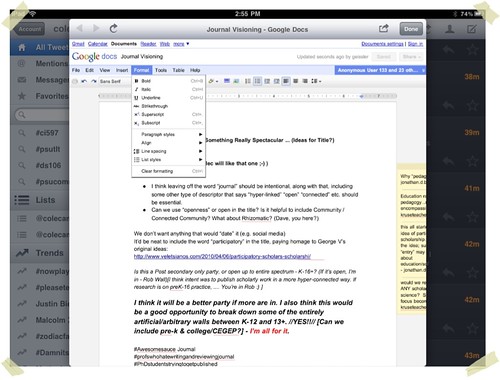I will be the guest editor of an upcoming issue of in education journal. Please consider submitting an article or feel free to pass on this call to others.
—
Editorial Call for issue 15/2 of in education (formerly know as Policy and Practice in Education)
In late 2007 the editorial board of Policy & Practice in Education made the decision to move the journal into a digital format. The rationale being,
in publishing research the intent is to reach as wide an audience as possible, publication costs have become insupportable, and competition is growing. We considered using the management and distribution services of a commercial publishing house, … however the notion of making knowledge more easily and broadly accessible suggested we look at open access publishing (Lewis & McNinch, 2007, p. 5)
To that end, from our current pdf print-based format, we are continuing to evolve the journal and with this forthcoming issue we will move more broadly into and across the digital landscape. However, that does not mean we will disregard the previous work of the journal from the past 15 years, but rather build upon and transcend those discussions, ideas and iterations. As we stated in our initial move to the digital format, the journal will continue to address issues, research and practice in the education of teachers, however we intend to augment the latitude and significance of the notion of education. As a result, we are inviting articles and reviews of works that not only explore ideas in teacher education, but also a broader and more inclusive discussion in education. We envision a discussion that also utilizes the ubiquitous growth of the digital arts and sciences in the everyday practice of living and how that (in)forms both formal and informal education.
With this forthcoming issue we are fortunate to have Dr. Alec Couros as guest editor and background coordinator. Dr. Couros will be launching this latest iteration of the journal as we continue and grow the conversation in education. Watch for the journal’s digital space to be launched in November of 2009.
Special Issue: Technology & Social Media – in education
To mark this important transition of the journal, a special issue will focus on technology & social media in education. Submitted articles should focus upon current theories, practice, or emerging trends and understandings within the context of teaching & learning, learning environments, or informal learning.
Some suggested topics are listed below:
– Social and participatory media (e.g., blogs, wikis, microblogging, video sharing) in teaching & learning.
– Mobile technologies, txting, or microblogging in learning, or implications for social justice & politics.
– Practical or philosophical discussions on open content or open educational resources.
– Implications & trends regarding open publishing & academia.
– Case studies of successful technology integration into learning environments.
– Discussions of distance, online, distributed, or flexible learning models in practice.
– Social networks, participatory media, and the implications for information & media literacy.
– Personal learning networks (PLNs), personal learning environments (PLEs) or related frameworks.
– Other topics related to social media, technology, and education.
Length: Manuscripts, including references, tables, charts, & media, should range between 10-20 pages (2500-5000 words). As the journal will be primarily web-based, we encourage articles that leverage digital forms of expression and dissemination.
Style: For writing and editorial style, follow the Publication Manual of the American Psychological Association (2001, 5th ed.). References should also follow APA style.
Review Process: Authors are informed when manuscripts are received. Each manuscript is previewed prior to distribution to appropriate reviewers. Manuscripts are anonymously reviewed. Once all reviews are returned, a decision is made and the author is notified. Manuscripts should consist of original material, and not currently under consideration by other journals.
Copyright: Accepted material will be distributed under an appropriate Creative Commons license (non-commercial, attribution)
Cover Page (for review purposes): Include title of manuscript, date of submission, author’s name, title, mailing address, business and home phone number, and email address. Please provide a brief biographical sketch and acknowledge if the article was presented as a paper or if it reports a funded research project.
Abstract: Please include a 50-100 word abstract that describes the essence of your manuscript.
Software Format: Submit in Word (.doc), Rich Text (.rtf), or Open Document Format (.odf). Other media welcome through prior consultation
Deadlines: Abstracts should be submitted by July 31, 2009. Once reviewed, if your abstract is approved, you will be asked to submit a completed manuscript by October 1, 2009.
For all inquiries or submission information, please contact Dr. Alec Couros via email couros@gmail.com or by phone at (306) 585-4739.
Update: The call for this issue is now closed. Thank you to all of those who have contributed abstracts or who have passed this call on to others.


